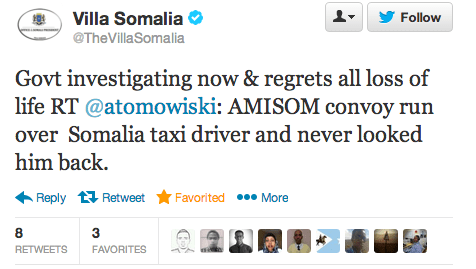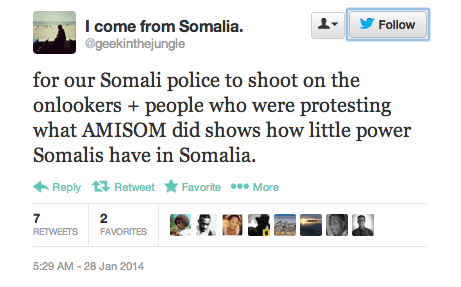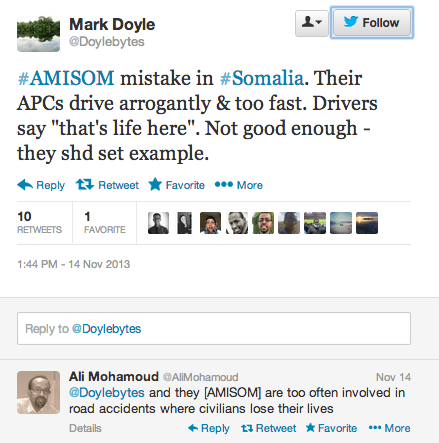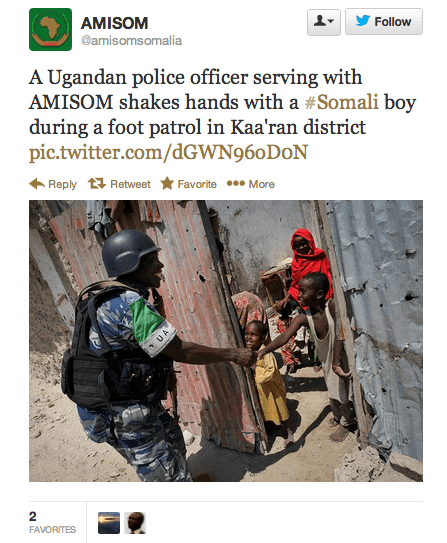On the morning of 28 January 2014, an AMISOM vehicle ran over a civilian on Maka al Mukarama road and left the scene in what African Union forces called a “tragic accident.”
The man killed in the hit-and-run was 41-year-old taxi driver Salah Nur Mohamed. The scene of the accident drew a large number of onlookers and protesters.
Amabassdor Annadif, AU Special Representative for Somalia and Head of AMISOM, was quoted in a press release, stating, “We deeply regret the tragic accident. Our prayers and thoughts are with the family of the deceased who have suffered such a heartbreaking loss.”
Social Media Responses
The incident sparked a huge response on Twitter with many using the #JusticeforSalah hashtag.
 Unsurprisingly, many were upset at what was perceived as a heartless–if not criminal–offense in which AMISOM left Salah in the road after the incident.
Unsurprisingly, many were upset at what was perceived as a heartless–if not criminal–offense in which AMISOM left Salah in the road after the incident.
Using its growing presence on Twitter, the account of President Hassan Sheikh Mohamud (@TheVillaSomalia) tried to assure those concerned that the government was pursuing more details.
Nevertheless, the tweet did not appease those who perceived the government as not taking sufficiently definitive action. Allegations that Somali police fired upon some of the protesters that arrived at the scene further inflamed responses. (Note: this could have been, rather, a crowd dispersal technique by firing shots in the air.)
Somalia analyst Mohamed Mubarak suggested facetiously that AMISOM pay the appropriate diyaa to Salah’s family for accidental murder.
Road Rage
For those who follow Mogadishu closely, the incident may not have been a surprise. Mustafa Osoble (@MAOsoble) pointed out that AMISOM’s often careless conduct on the roads was well documented.
A tweet from BBC journalist Mark Doyle back in November 2013 described his account of AMISOM’s questionable behavior on the road–followed by a confirming comment by noted Somalia commentator Ali Mohamoud.
Sensing the heat coming on social media, AMISOM’s Twitter account ostensibly attempted some damage control by tweeting a photo of its positive outreach in Mogadishu.
AMISOM’s Sacrifice
Importantly, AMISOM forces risk and often lose lives assuredly more often than they are responsible for civilian deaths–especially in comparison to the violence wreaked upon communities by al-Shabaab.
However, there are rarely outbursts of mourning when deaths of AMISOM forces are reported.
Perhaps al-Shabaab’s long accepted reputation for indiscriminate violence and its identification as a “local” group changes the way killings by the group are perceived–a mix of desensitization and family fighting.
However, few would tolerate the “stranger” contributing to the mêlée.
Though AMISOM may enjoy immunity from being prosecuted locally, a 2012 report written fittingly by two officers in the Peace Support Division of the AU Commission urged (quite emphatically) for AMISOM to develop stronger frameworks for accountability after incidents such as this in order to assure civilians that there is some level of consequences for its actions.
It also alleged that prior accountability had occurred–which are examples AMISOM should perhaps highlight to avoid accusations of impunity.
“…while much progress has been made in reducing the risks faced by the civilian population in the conduct of AMISOM military operations, a view still persists among the Somali people that AMISOM troops are immune from disciplinary action or other forms of accountability when the mission is responsible for causing civilian harm. To date, numerous AMISOM military personnel have been repatriated from the mission area. they have faced disciplinary action in their home countries for violations which have resulted in civilian injury. But hitherto neither AMISOM nor the AU have developed a clear conduct and discipline policy.”
Even though al-Shabaab recently limited some access to the Internet in its areas, the group and its sympathizers will certainly be providing as many details as possible about AMISOM’s responsibility for Salah’s death–further underscoring the need for AMISOM to find the appropriate response for its fatal accidents.
Discover more from
Subscribe to get the latest posts sent to your email.



















 2013 in Somalia: A Look at Security
2013 in Somalia: A Look at Security  Somali Government and AMISOM Troops Move Into Balcad in Middle Shabelle Region
Somali Government and AMISOM Troops Move Into Balcad in Middle Shabelle Region
Nobody and nobody is above the law
Nobody and nobody is above the law.Salah Nur may you R.I.P
I wonder why amisom should enjoy ‘immunity
from being prosecuted locally’……. and something has to be done about it. no one is above the law.